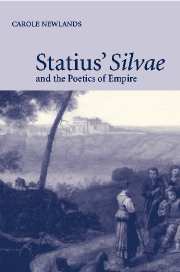Book contents
- Frontmatter
- Contents
- Acknowledgments
- 1 Introduction
- 2 Embodying the statue: Silvae 1.1 and 4.6
- 3 Engendering the house: Silvae 1.2 and 3.4
- 4 Imperial pastoral: Vopiscus' villa in Silvae 1.3
- 5 Dominating nature: Pollius' villa in Silvae 2.2
- 6 Reading the Thebaid: Silvae 1.5
- 7 The emperor's Saturnalia: Silvae 1.6
- 8 Dining with the emperor: Silvae 4.2
- 9 Building the imperial highway: Silvae 4.3
- References
- Index locorum
- Index of subjects and proper names
7 - The emperor's Saturnalia: Silvae 1.6
Published online by Cambridge University Press: 22 September 2009
- Frontmatter
- Contents
- Acknowledgments
- 1 Introduction
- 2 Embodying the statue: Silvae 1.1 and 4.6
- 3 Engendering the house: Silvae 1.2 and 3.4
- 4 Imperial pastoral: Vopiscus' villa in Silvae 1.3
- 5 Dominating nature: Pollius' villa in Silvae 2.2
- 6 Reading the Thebaid: Silvae 1.5
- 7 The emperor's Saturnalia: Silvae 1.6
- 8 Dining with the emperor: Silvae 4.2
- 9 Building the imperial highway: Silvae 4.3
- References
- Index locorum
- Index of subjects and proper names
Summary
Iubes esse liberos, erimus
Pliny, Panegyricus 66. 4Duceris ut nervis alienis mobile lignum
Horace, Satirae 2. 7. 82Silv. 1. 6 concerns a public, imperial peformance – the gifts, banquet, and spectacular shows – provided by the emperor for the people on the occasion of the Saturnalia. We move then as readers from the private enclosed space of the baths to the public enclosed space of the amphitheatre, from an atmosphere of exclusivity to one of inclusivity, as people of all ranks and races join together in the carnivalesque celebration of the winter feast. Unlike Horace, who in Sat. 2. 3 withdraws from Rome at the Saturnalia to write poetry, Statius takes on the challenge of describing the winter festival at which he himself takes part. But he abandons the authoritative, performative role of Silv. 1. 5 and, on the whole, presents himself as simply one of the spectators at the amphitheatre, viewing the performance of others through the collective pronoun ‘we’ (nos). Domitian, not Statius, is master of ceremonies here; the new culturally coercive power of the amphitheatre absorbs the poet's voice into the crowd. The poem thus mediates here between two types of consciousness that are not necessarily compatible. The poet represents himself as a spectator, not a performer; he is both part of the crowd and yet he is also separate from it in his attempt to commit to published form the day's events.
- Type
- Chapter
- Information
- Statius' Silvae and the Poetics of Empire , pp. 227 - 259Publisher: Cambridge University PressPrint publication year: 2002



